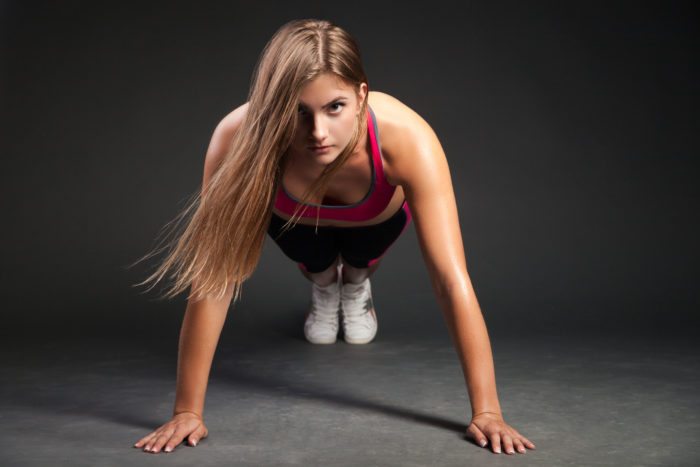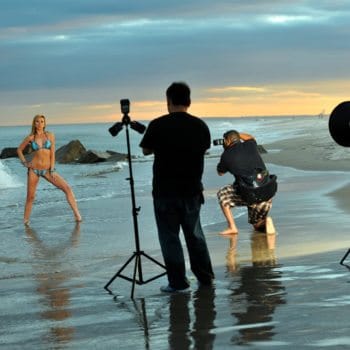Fitness models pose for product photos, advertisements, and magazines. They specialize in selling fitness products, and are commonly more muscular and defined than fashion models. Fitness models often find work modeling for sporting goods stores, or they pose for article photos for fitness magazines.
Recommended Schools
What is a Fitness Model?
The following job responsibilities are common for individuals in fitness model roles:
- Pose for photographs for a variety of mediums, wearing athletic clothing or using fitness or weightlifting equipment
- Alter facial expressions, poses, and gestures to capture the impression the photographer is aiming for
- Sit for hair styling, makeup application, and spray tanning prior to photo shoots
- Maintain a portfolio and composite card, and actively seek new modeling opportunities
A Day in the Life
Fitness models are models with muscular and athletic figures that specialize in posing for advertisements, products photos, and magazines that are geared toward athletes and individuals interested in physical fitness. They are photographed to sell a variety of fitness and health products. For example, they may pose in workout clothes, they may pose with weightlifting equipment, they may pose for weight supplement products, or they may be photographed using sporting equipment.
The goal of the fitness model is to make people think that by using the advertised product, they’ll be able to look as physically fit as the model. For this reason, fitness models commonly spend more time working out and lifting weights than they do modeling. Maintaining a defined figure is crucial for finding work in the field, so in addition to finding work and appearing in photo shoots, they spend an hour or more a day exercising, lifting weights, and eating the right foods to stay physically fit.
In addition to posing for photo shoots and working on their fitness routine, fitness models may spend a significant amount of time looking for modeling opportunities. They often work with agencies that help them find work, but they may also spend a lot of time collecting images, crafting their portfolios, creating composite cards, and networking with clients to find new modeling jobs. Before a photo shoot, they may need to have hair and makeup styled, and they may also need to have a spray tan applied.
Typical Work Schedule
There is no set schedule for working as a fitness model. At times fitness models work much more than 40 hours a week, and at times they may have little work and work only part-time hours. They may need to travel for work to meet with clients or participate in photo shoots, and they may be required to work long hours on days of photo shoots, beginning early in the morning and working late into the evening.
Typical Employers
For the most part, fitness models are self-employed, though they typically have contracts with agencies that help them find and secure work. Their clients often include sporting goods stores, fitness magazines, and health/workout supplement manufacturers and retailers.
Recommended Schools
How To Become a Fitness Model
A high school diploma is a sufficient amount of education to become a fitness model, though some fitness models also attend modeling school. Modeling school can be beneficial for aspiring fitness models because it teaches students how to pose and how to alter facial expressions to create impressions. It may be beneficial to find a program that specializes in fitness modeling because many of the skills required of fashion models—such as walking on a runway—do not apply for fitness models.
The most important quality for fitness models is meeting the aesthetic requirements of clients. While fashion models tend to be tall and thin, fitness models can be any height, but they must be very physically fit. This means that working on your physique, eliminating fat, and ensuring you have defined, visible muscles is crucial. The goal of a fitness model is to encourage people to engage in weightlifting and fitness activities in order to look more like the model, so a defined physique is important.
While the right education and figure are important, you may also need to find a modeling agency to represent you. While it’s possible to find work as a model without an agency, most clients prefer working with agencies, so not having an agency could limit your potential job opportunities. Before choosing a modeling agency, it’s important to do research and find reputable agencies. You’ll also need to work to build a portfolio of your work to present to modeling agencies and potential clients.
Fitness Model Salary Data
We’ve provided you the following to learn more about this career. The salary and growth data on this page comes from recently published Bureau of Labor Statistics data while the recommendations and editorial content are based on our research.
National Anual Salary
Low Range
$18,780Average
$37,240High Range
$54,670National Hourly Wage
Low Range
$9/hrAverage
$18/hrHigh Range
$26/hrHow do Fitness Model salaries stack up to other jobs across the country? Based on the latest jobs data nationwide, Fitness Model's can make an average annual salary of $37,240, or $18 per hour. This makes it an Above Average Salary. On the lower end, they can make $18,780 or $9 per hour, perhaps when just starting out or based on the state you live in.
Salary Rankings And Facts
#579 Nationally for All Careers
Highest Education Among Fitness Models
- 0.4% Doctorate
- 2.4% Masters
- 18.4% Bachelors
- 8.8% Associates
- 27.6% College
- 30.7% High School
- 11.7% Less than High School
Job Growth Projections and Forecast
2014 Total Jobs
5,8002024 Est. Jobs
5,800Job Growth Rate
---Est. New Jobs
---How does Fitness Model job growth stack up to other jobs across the country? By 2024, there will be a change of --- jobs for a total of 5,800 people employed in the career nationwide. This is a --- change in growth over the next ten years, giving the career a growth rate nationwide of Below Average.
Growth Rankings And Facts
#594 Nationally for All Careers
What Companies Employ The Most Fitness Models
| Industry | Current Jobs | New Jobs Needed | % Increase |
|---|---|---|---|
| Clothing stores | 2,700 | -300 | 0% |
| Colleges, universities, and professional schools; private | 1,000 | --- | 0% |
| Self-employed workers | 500 | --- | --- |













